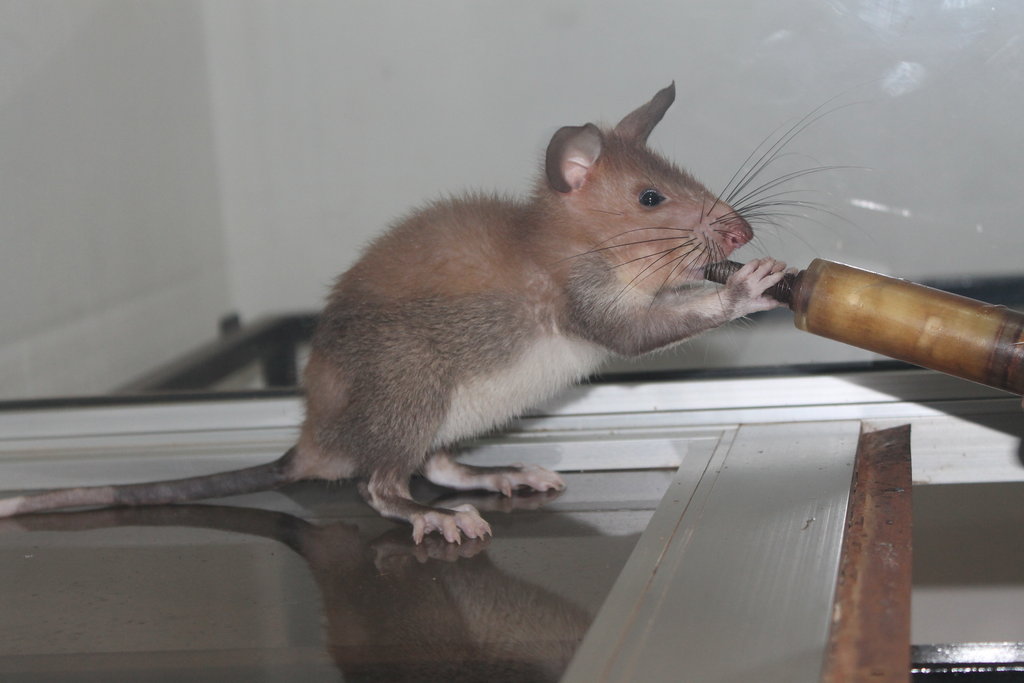By Chris Hines | Project Leader
Dear Supporters,
Thank you for your life-saving support to APOPO. Due to your generosity, we have started training Nasri, the HeroRat, to detect landmines. Here is what the journey of Nasri will entail over her nine month training process. This process forms the foundation for a successful 6-7 year lifespan of the mine detection rat to significantly impact the landmine removal movement.
3-4 weeks of age
At 3-4 weeks old the baby rats can open their eyes and at this time they still live with their mothers, but minimal socialization by one of our caretakers can begin.
5-6 weeks of age
The rats are weaned from their mother, and they begin a period of socialization. During this period, the caretaker and trainers expose the rats to different smells, sounds and textures, for example hearing music or a motorcycle engine, smelling flowers or coffee, exploring different surfaces like grass, concrete and soil, and going for a ride in the HeroRAT truck. This is an essential part of the training process: the rats need to feel comfortable and relaxed in the human environment they will be working in, to ensure they are not afraid.
Click training
After two weeks of nursing, the rats begin click training twice a day, in approximately 5 minute sessions. Here they learn to associate the “click” sound with a food reward. This takes place in a square glass-walled cage, with a small food hole in one wall. Immediately after the rat hears the “click”, the trainer gives them a mouthful of mushed banana and crushed pellets. Click training takes one-two weeks.
One hole and Three hole
Once the rats learn that “click” means food, trainers can begin to teach the rats that they must now find something in order for the “click” and subsequent food reward. They start with one hole in a three-hole cage. When the rat goes to the hole, they hear a “click” and must learn to return to the food hole to receive their reward. They do this twice a day for one week, for 5-10 minute sessions. Once the rat has learned to go to one hole and then respond correctly to the clicker, trainers begin to introduce more holes (3), with one positive and two neutral samples.
Soil floor
This stage is designed to bridge the gap between the small three-hole cage the rats being their training in, and the much larger landmine detection training field. In this stage, the rats learn to work in soil in one of our soil trays/boxes. Here they get used to working outdoors in different environmental conditions, wearing a rat-sized harness connected to the training bar, and walking back and forwards in a line. The rats spend about one week in this stage, in preparation for graduation to the field.
Tea eggs
This is the first stage at the landmine detection training field. Tea eggs containing a sample of pure TNT (the explosive compound found in many landmines) are placed in the training box and covered with soil. The young rats are then harnessed to the training bar, which two trainers stand on either end of and roll over the area. When a rat finds a tea egg, it scratches the surface, the trainer “clicks”, and the rat goes to the trainer for their food reward, then goes back to work. It takes about one to two weeks for the rats to learn this process.
Three meter and Five meter
Once the rats have learned to find TNT in tea eggs they must learn to locate real (deactivated) landmines. At this stage there are landmines at regular intervals, buried just below the surface or partially exposed. Rats spend about four weeks adjusting to real landmines, and learning to clearly and consistently indicate the location of the mines by scratching at the surface of the ground. The rats then move to a bigger area called five meter (5 x 20 meter boxes of land) where there are fewer mines, spaced further apart.
Advanced
The advanced stage is made up of 100 square meters boxes (5 x 20 meter boxes or 10 x 10 meter areas) in which there are between zero and four mines buried. They are harnessed and run back and forth on a line / bungee cord which is attached to the boots of two trainers. The rats gradually work up to covering 400 square meters per day and are then given a blind test. Rats must pass three of these blind tests before they are internally accredited by APOPO and considered ready for deployment in a Mine Action Program.
Official accreditation
Once deployed, the rats go through a period of acclimatization and training in the new country of deployment, currently either Mozambique or Angola. All rats must then pass an official accreditation test according to International Mine Action Standards (IMAS). The national demining authority, in the country where the rats have been deployed, conducts this test. Only once they pass this test will they be considered official Mine Detection Rats (MDRs) and be able to begin work in the real minefields.
Links:
Project reports on GlobalGiving are posted directly to globalgiving.org by Project Leaders as they are completed, generally every 3-4 months. To protect the integrity of these documents, GlobalGiving does not alter them; therefore you may find some language or formatting issues.
If you donate to this project or have donated to this project, you can recieve an email when this project posts a report. You can also subscribe for reports without donating.
